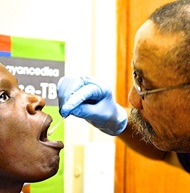HomePulmonology
Pulmonology
Boosting oxygen may save preterm infants – Sydney study
In a challenge to existing recommendations, researchers say delivery room resuscitation with high initial levels of oxygen for very preterm infants could reduce their...
Scientists uncover cause of severe Covid lung disease
A recent study has shed light on the mystery of why, in some severe Covid-19 cases, the lungs undergo extreme damage, resulting in various...
Biased oximeter readings skewed Covid treatment – US cohort study
A review of thousands of cases from the first years of the Covid-19 pandemic – using pulse oximeters – found levels of oxygen in the...
Eczema jab could be breakthrough COPD treatment
Medical specialists say a shot used to treat eczema might be a breakthrough for Chronic Obstructive Pulmonary Disorder (COPD) – which affects millions of...
Post-TB lung disease more common than Covid in SA
Millions of people in South Africa are suffering from post-TB lung disease, which is far more common than Covid and the most common cause...
Early diagnosis hope with new cystic fibrosis screening programme
A new screening programme for cystic fibrosis (CF) in on the cards for South Africa which, it is hoped, will diagnose cases in newborns...
Viagra may reduce pulmonary fibrosis mortality – Canadian meta-analysis
Sildenafil (Viagra, Pfizer), a phosphodieterase-5 (PDE-5) inhibitor and a pulmonary-selective vasodilator, may reduce mortality in patients with idiopathic pulmonary fibrosis (IPF), compared with placebo...
Obesity in women significantly increases risk for airway obstructive diseases
A population-based cohort study in Korea has suggested that obesity may put women at a higher risk for airway obstructive diseases like chronic obstructive...
Honey superior to usual care for upper respiratory tract infections — Oxford study
Honey was superior to usual care for the improvement of symptoms of upper respiratory tract infections (URTIs), a University of Oxford study found.
The Guardian...
Occupational exposure an important risk factor for COPD
An international team led by researchers from the Barcelona Institute for Global Health (ISGlobal), a centre supported by the "la Caixa" Foundation, has provided...
Beta blockers have positive effect in pulmonary arterial hypertension
A team of Cleveland Clinic researchers found that a common heart disease medication, beta blockers, may help treat pulmonary arterial hypertension (PAH), a debilitating...
Smoking blocks lungs' self-healing processes
Smoke from cigarettes blocks self-healing processes in the lungs and consequently can lead to chronic obstructive pulmonary disease (COPD), according to researchers at the...
Good results from two-drug cystic fibrosis tx
Treatment with two medications that target the most common genetic cause of cystic fibrosis improves lung function and lowers the rate of pulmonary exacerbations, according to the results from a Phase III international clinical trial.
COPD sufferers face increased risk of SCD
Those with chronic obstructive pulmonary disease (COPD) have a 34% increased risk of sudden cardiac death (SCD) overall, but their risk almost doubles more than five years after first being diagnosed with COPD.
Protein may activate inflammatory response
A Northwestern Medicine study shows that a protein called vimentin may help activate an inflammatory response that leads to acute lung injury.
Higher lung cancer surgery risks than thought
Three presentations at the 95th Annual Meeting of the American Association for Thoracic Surgery suggest that lung cancer surgery patients are at higher risk of developing venous thrombo-embolism, including deep vein thrombosis and pulmonary embolism, than previously thought.
Adoption of LVRS for emphysema urged
Despite the the efficacy of lung volume reduction surgery (LVRS), its adoption for severe emphysema has been exceedingly poor. A new Columbia University study finds that minimally invasive LVRS can be performed with negligible surgical mortality risk.
Potential root cause of asthma found
Scientists have for the first time identified the potential root cause of asthma and an existing drug that offers a new treatment.
Steroids: 'Substantial' risk of adrenal malfunction
After stopping steroids commonly prescribed for asthma and allergies, a significant number of people may experience signs of malfunctioning in the adrenal glands, a European study finds.
Three-drug TB regimen shows promise
 A new tuberculosis (TB) drug regimen designed to improve options for TB therapy eliminated more bacteria from sputum than standard therapy and did so at a faster rate, according to data from a phase 2b clinical trial in SA and Tanzania.
A new tuberculosis (TB) drug regimen designed to improve options for TB therapy eliminated more bacteria from sputum than standard therapy and did so at a faster rate, according to data from a phase 2b clinical trial in SA and Tanzania.Stem cell 'mini lungs' aiding CF research
University of Cambridge scientists have successfully created 'mini-lungs' using stem cells derived from skin cells of patients with cystic fibrosis (CF), to test potential new drugs.
Bariatric surgery reduces asthma risk in obese
A study led by Massachusetts General Hospital (MGH) investigators suggests that bariatric surgery can significantly reduce the risk of asthma attacks in obese patients.
SA 'game-changer' in TB diagnosis
 Drawing inspiration from veterinary medicine, researchers at the SA Tuberculosis Vaccine Initiative, the University of Cape Town and the University of Washington, have developed a new approach to detect tuberculosis (TB) – easy-to-obtain oral swab samples.
Drawing inspiration from veterinary medicine, researchers at the SA Tuberculosis Vaccine Initiative, the University of Cape Town and the University of Washington, have developed a new approach to detect tuberculosis (TB) – easy-to-obtain oral swab samples.Molecule opens way to new TB treatments
Johns Hopkins researchers have uncovered how a bacterial molecule controls the body’s response to TB infection and suggest that adjusting the level of this molecule may be a new way to treat the disease.
XDR-TB not result of treatment failure
The vast majority of people with extensively drug-resistant tuberculosis (XDR-TB) have acquired their infection from another person, not as the result of the failure of treatment for multidrug-resistant strains of tuberculosis.
Trial asthma drug halves severe attacks
Clinical trials found that an investigational drug appears to halve the risk of severe asthma attacks in patients who have difficulty controlling the disorder with standard medications.
Gallopamil efficacy in severe asthma
French researchers have demonstrated the clinical efficacy of gallopamil in 31 patients with severe asthma, where it significantly reduced the bronchial smooth muscle mass and resulted in fewer prolonged attacks.
Corticosteroids supported for pneumonia
Spanish research determined that in community-acquire pneumonia patients there was two-thirds lower treatment failure from corticosteroid treatment than the placebo.
Cancer drugs could help treat TB
The same antiangiogenesis drugs that improved treatment of some cancers could help surmount persistent difficulties in treating tuberculosis (TB), according to investigators from the US National Institute of Allergies and Infectious Disease.
Common cold thrives in a cool nose
The common cold virus can reproduce itself more efficiently in the cooler temperature found inside the nose than at core body temperature, according to a new Yale-led study.
Medical student makes cystic fibrosis breakthrough
A medical student on work experience has made a breakthrough in cystic fibrosis research that will improve treatment and could extend sufferers’ life expectancy....
